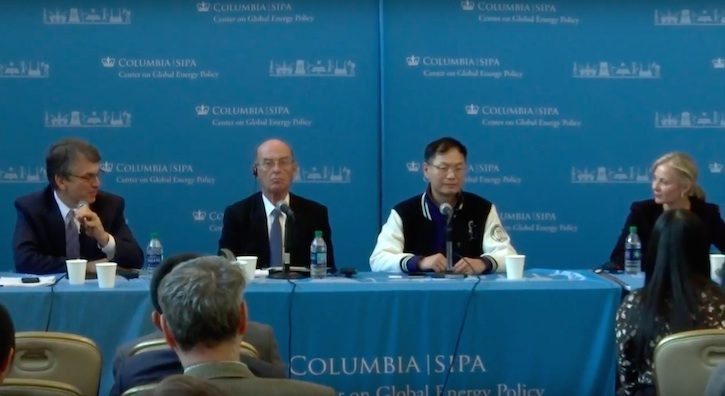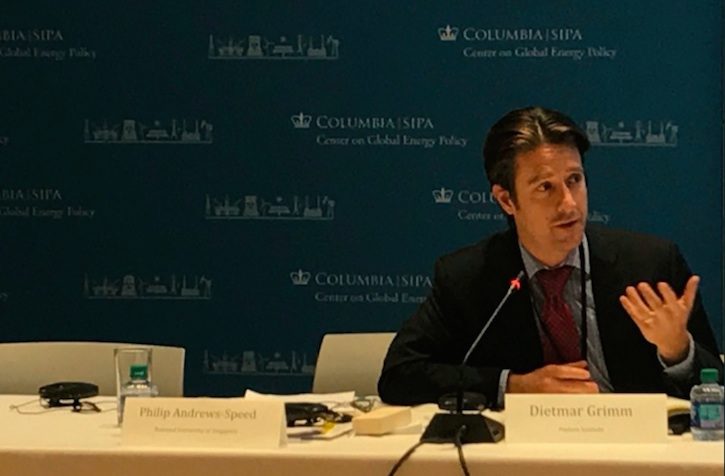
By Phylicia Wu
The Belt and Road Initiative (BRI) is a four-year-old geostrategic policy initiative launched by China that is increasingly getting more attention, devotion, and resources with the launch of an international summit earlier this year by President Xi Jinping, and the inclusion of a BRI specific amendment into China’s constitution in October. The importance to China of the BRI is clear and the dialogue surrounding green development of the BRI—including green finance—is timely.
From November 20th through the 21st, the Paulson Institute (PI) participated in the Belt and Road Green Development Conference hosted by Columbia University’s Center on Global Energy Policy and Renmin University Center for International Energy and Environment Strategy Studies. The Conference brought together global experts from business, academia, and policy. PI Vice Chairman Deborah Lehr spoke about green finance developments in a session devoted to capital market implications on the BRI, and PI President Dietmar Grimm offered closing comments on the next steps for continuing the BRI green development dialogue. Lehr was also a panelist at the concluding session of the conference, an open event for the public, and reiterated China’s latest green finance advances.

Participants at the conference explored a broad scope of issues that influence the green development of the BRI including the current state of green development, renewable energy development, fossil fuel development, and capital market effects. While comprehensive in scope, the high-level objectives of establishing high standards and enforcing transparency for green development on the BRI were recurring themes—particularly applicable to green finance—throughout the conference.
Some additional points raised at the conference include:
- Potential Global Nature of BRI—The global nature of the BRI encouraged debate on the geostrategic, soft power, and people to people effects of China’s role (or impact) as the leader on the countries along the BRI. As a facilitator of connectedness, the BRI may have a globalizing effect, but concerns of the impact on domestic politics of BRI recipient countries exist.
- Wide Information Gap—There is an information gap that stems from the lack of consensus on the definition for green criteria and the disconnect between expectations and perceptions of BRI recipient countries and BRI funding countries.
- Need for Increased Cooperation—Participants emphasized that further international cooperation is needed, such as in advancing an overarching green development framework for BRI or for pooling of shareable green development capacities and best practices. It was also highlighted that national governments should cooperate with the business, academic, and think tank communities. For example, the collaboration of national Chinese funds and banks established to finance the BRI with the various players in the global financial system from private funds to multilateral development banks would be an indispensable key to initiating innovative green finance tools and mechanisms.
- Creation of Standards and Metrics—Participants collectively called for establishing a comprehensive set of high standards and creation of metrics to clarify green development along the BRI for accountability purposes. However, a certain degree of transparency must be present for this to be feasible.
- Concerns over the Role of Nuclear Technology—The uncertainty of promoting and using nuclear energy along the BRI was recurring as it remains one of the more controversial renewable energy sources. Questions surrounding safety and regulatory standards of nuclear energy infrastructure in Belt and Road countries lead to agreement on the need for more discussion.
- Existence of Abundant Capital—Global capital markets have capital to finance infrastructure projects, but much of it remains locked and unused. Further research into generating a pipeline of viable projects, gaining a better understanding of distinctions between the financial system practices of Western countries and China, and designing new green financial instruments need to be tackled to fully fund the BRI.
The conference organizers aim to expound on the points raised and continue the conversation at a second meeting in Beijing. The Paulson Institute is delighted to have participated in this event.




